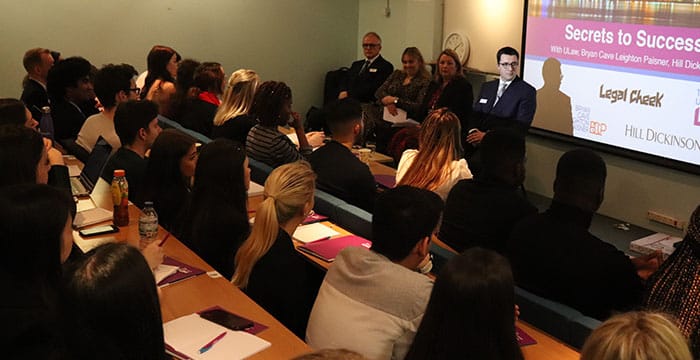Four experts make the case for starting your career in the North West

At the Liverpool leg of Legal Cheek and The University of Law’s (ULaw) student careers and commercial awareness ‘Secrets to Success’ series, Hill Dickinson banking and finance head Richard Capper; Bryan Cave Leighton Paisner senior associate Samantha Blackburn; Exchange Chambers barrister Alex Williams; and ULaw Liverpool campus dean Carol Draycott came together to offer their views on the city’s bustling legal scene.
The Northern Powerhouse
The action is fast moving to the North, all the panellists agreed, and it is time to set aside old misconceptions about legal opportunities in the regions. The ‘Northern Powerhouse’, first raised by the coalition government, is back on the agenda with a vengeance and legal firms in the North are primed for new opportunities.
“The Northern Powerhouse project is all about repositioning the economy outside of London and the South East,” said Richard Capper, head of banking at Hill Dickinson, whose work involves property finance, acquisition finance, restructuring and general corporate lending.
The political ramifications of the fall of Labour’s so-called ‘Red Wall’ to the Conservatives has raised hopes of large-scale investment in infrastructure in the North with the government’s new political imperative to “level up” previously neglected regions.
The flagship project remains HS2, but there is also heavy lobbying for the Northern Powerhouse rail from Manchester to Leeds and a proposal to consider relocating the House of Lords to York.
Hill Dickinson’s position as an international commercial law firm headquartered in Liverpool gives the firm a clear perspective on the potential boom for law firms from the new political focus on the North.
The panellists agreed there had been a general misconception about the quality of work and the stature of clients in the North. Capper pointed out that every major bank has a significant presence in the North West. He said that Liverpool particularly offered a diverse range of corporates, including the headquarters of some big companies and smaller, more boutique clients, ensuring a rich variety of work for corporate lawyers.
Alex Williams, a specialist in personal injury at Exchange Chambers, offered the perspective from the bar, and explained that the quality of work in the North can be bigger and more interesting than that from London. His chambers is known in the legal world as the “Northern Powerhouse”, and Williams explained how billions of pounds worth of top work is focused in Liverpool and the North, as well as being where some of the biggest court cases in recent times have been heard. Judges have made it clear that “no case is too big for Liverpool”, and that junior barristers enjoy the same opportunities as in London, but with the huge bonus of a better work-life balance.
Carol Draycott, The University of Law dean for the Liverpool and Chester campuses, further explained the benefit of future lawyers studying and training in the North. Draycott stated that for students based in Liverpool, being able to train in Liverpool, as opposed to London, enables them to find out about all the great things about living and working in the North West, and helps to better prepare them for a career there.
Legal tech
The message from the panel is clear: legal technology can be a brilliant thing for future lawyers.
We rolled out our very own cutting-edge tech in the form of an online survey, and found that 67% of our audience members predict legal tech to be the biggest disruptor in law over the next ten years.
AI is often a cause of anxiety among aspiring lawyers, who fear the replacement of junior lawyer work by automation and robots. The panel reassured attendees that the brave new world of legal tech could greatly benefit future lawyers.
Draycott explained that the younger generation are more tech savvy and will be the ones driving the legal world into AI. They will possess the advantage of being properly trained in legal technology at the start of their careers.
Why it's good to be tech-savvy
Carol Draycott, dean of The University of Law’s Liverpool and Chester campuses, reveals why automation and AI shouldn't faze future lawyers #LCCareers
Posted by Legal Cheek on Tuesday, 10 March 2020
“Future lawyers will be saved from countless hours of repetitive tasks by AI”, said Bryan Cave Leighton Paisner senior associate Samantha Blackburn, whose work involves running a real estate team in Manchester, dealing with asset management and transactional work. For a previous generation, computers and databases saved lawyers many hours of searching through libraries for case law. In much the same way that students and lawyers are grateful for online products such as Westlaw and Nexus, so too might we start to view AI products.

Capper gave the example of the many reading hours required in dealing with a loan agreement. Today, the process is instantaneous through the use of technology. The clients are billed less, and lawyers spend less time on repetitive tasks — a win-win.
Williams said that the bar is particularly safe from jobs being taken over by tech, explaining that empathy is a key requirement for the job. “The client is a human being, who wants to know why the answer is what it is. Lawyers need to explain why something is the way it is, and not some other way,” he said. Work at the bar remains a field where advocacy and persuasion are key, and that is not going to change.
Careers advice
The discussion closed with each panellist asked to give a piece of advice to aspiring future lawyers.
Williams kicked off by stating the benefit of specialising early — explaining that the days of being a general corporate or broad common law barrister, focusing on crime, family and civil law, are over. The trick is to find your niche and specialise in a particular area.
Capper acknowledged the great difficulty in breaking into the legal world today compared to his generation and noted the importance of resilience for those wanting to become lawyers. He added his advice for those seeking a training contract or pupillage: “Push for lots of interviews, lots of experience through open days, insight schemes and vacation schemes. Don’t give up!”
Blackburn advised aspiring lawyers to be open to change. She explained how changes in the legal world are forcing lawyers to be adaptable. Green technology is bringing in new legal work that has never been done before, such as arranging the leases of electricity charging points for cars. Moreover, the alternative business structure (ABS) regulation is changing the way in which firms operate. Firms are becoming more commercial themselves, and this broadens the kind of job available and what you might want to do. ABS and the legal market are changing the industry, but those who remain open to new developments will find that there will be more opportunities for future-facing lawyers.
Draycott closed off the discussion with her advice to aspiring lawyers to stay ahead of the curve in terms of AI and technological advancement. She recommended reading articles online, listening to tech podcasts, and most importantly, attending events such as this, in order to be perfectly positioned to embrace a tech-based legal career!
About Legal Cheek Careers posts.


